-
Mesh Produce Bags - 6 Bags (2L, 2M, 2S)
Regular price $16.99Regular priceSale price $16.99Unit price per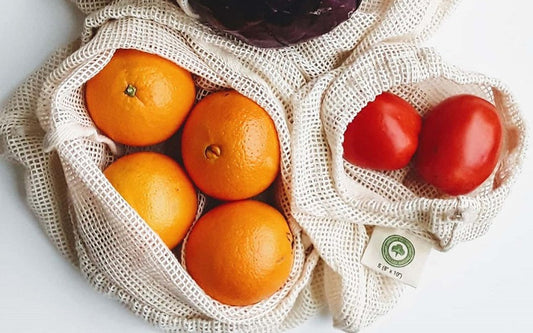
-
Mesh Produce Bags - 6 Bags (3M, 3S)
Regular price $16.99Regular priceSale price $16.99Unit price per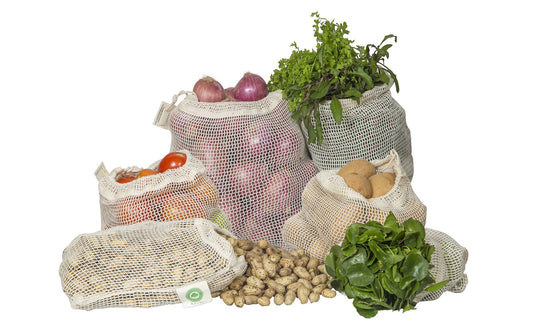
-
Mesh Produce Bags - 6 Bags (3XL, 3L)
Regular price $24.99Regular priceSale price $24.99Unit price per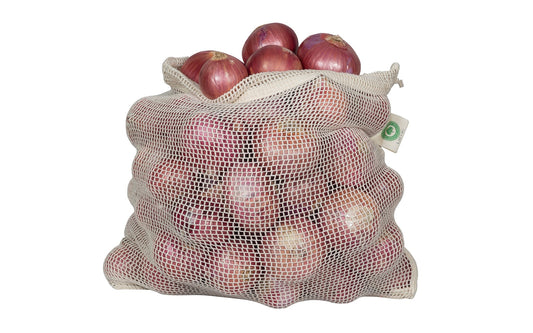
-
Mesh Produce Bags - 8 Bags (2XL, 2L, 2M, 2S)
Regular price $22.99Regular priceSale price $22.99Unit price per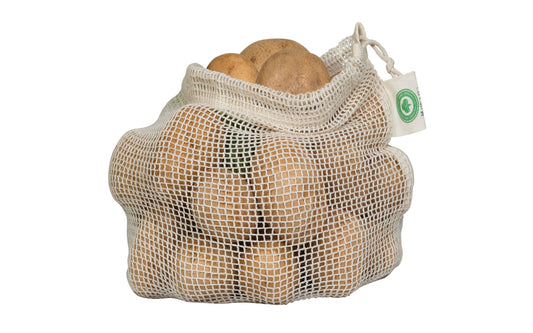
-
Mesh Shopping Bag - 1 Bag
Regular price $13.99Regular priceSale price $13.99Unit price per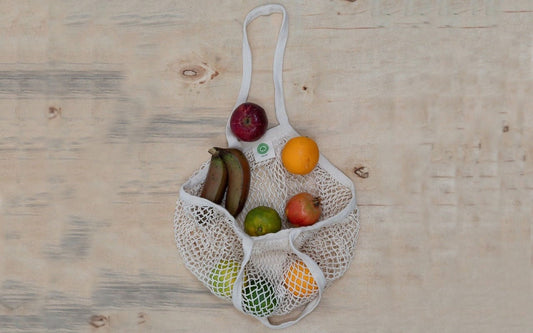
-
Mesh Shopping Bag - 2 Bags
Regular price $17.99Regular priceSale price $17.99Unit price per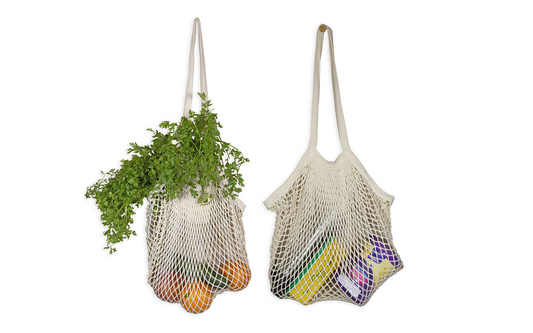
-
Mesh Shopping Bag - 3 Bags
Regular price $22.99Regular priceSale price $22.99Unit price per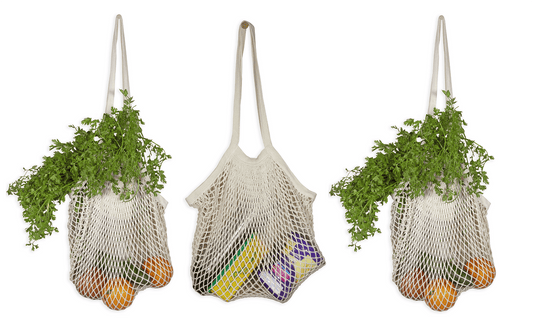
-
Onion Storage Bags - 3 Bags
Regular price $16.99Regular priceSale price $16.99Unit price per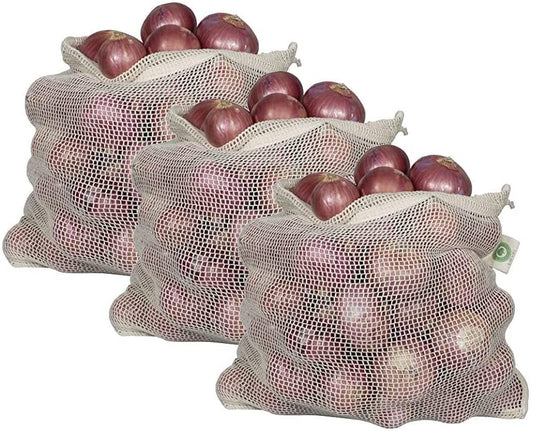

If you’ve found yourself searching the internet to know more about reusable bags, then kudos to you! You have taken a big step forward towards living sustainably and reducing your carbon footprint.
Plastic bags are on their way out, and as you all know, are a big barrier in our fight against climate change. Thankfully, there is a much better alternative that is long-lasting, better quality, and eco-friendly!
Say hello to - reusable mesh produce bags.
Reusable mesh produce bags not only have a significantly lesser carbon footprint but are also far more breathable than their plastic counterparts, keeping your fruits and veggies fresh for longer!
Let’s take a look at what reusable mesh bags are all about, their benefits, and how to care for them.
Types of Mesh Produce Bags
Broadly, there are two types of mesh produce bags - the Nylon or polyester mesh bags and cotton mesh produce bags.
Let’s explore both these types in more detail and share their qualities:
Nylon/Polyester Mesh Produce Bags:
-
Environmental impact: Nylon mesh bags may be easy and comfortable to carry - but a major downside is that the production of these bags is a very energy-intensive process.
In a study done in 2017, called the Pulse of Fashion Report, it was proved that nylon tops the list of synthetic materials that had the highest impact on the environment.
Production of nylon or polyester bags results in high emission of greenhouse gases like methane and nitrous oxide which are 300 times more potent than carbon dioxide, which leads to pollution and global warming. We don’t want that, do we?
-
Non-biodegradable: Nylon and Polyester are not biodegradable. They are not sustainable options as they are made from petrochemicals, which are not biodegradable.
Materials like Nylon are made from polymer, which is a kind of plastic, and are manufactured from harsh chemicals, and they persist in the environment for a long time. To add on, they’re a massive threat to aquatic life.
-
Not compostable: Polyester and nylon are partially derived from petroleum. They are man-made fibers. This means that they are not going to break down for a long time (20-200 years).
They cannot be turned into compost. And are going to hang around polluting the environment for quite a long time.
-
Nylon and Polyester bags tear easily: Carrying your fruits and veggies requires a nice, strong, durable bag, which can stretch and also handle a good amount of weight.
Compared to other materials like Polypropylene or cotton, these bags tear much easier and quicker. Polyester especially is a weaker material than nylon.
Cotton Mesh Produce Bags:
-
Environmental impact: The manufacturing process of cotton (especially organic cotton) is way greener and less energy-intensive than that of synthetic materials.
Producers of cotton focus massively on the fertility of the soil, not using any harmful chemicals or synthetic fertilizers in the process. Once you dispose of a cotton mesh bag, it can easily get recycled, it's just great for our planet.
- These are biodegradable: Organic cotton is very sustainable. Cotton mesh produce bags can degrade with or without oxygen because it's primarily made of cellulose, which is a great compound for plant walls and vegetable fibers.
- Produce remains fresh: Cotton, which is made of cellulose, is a carbohydrate. As a result, it is quite breathable, and compared to other materials like plastics or nylon, absorbs water molecules easily and keeps your fruits and veggies fresh for longer - making them a great option for you to invest in them!
Factors to Consider Before Purchasing Mesh Vegetable Bags
To ensure that you get the highest quality mesh bag, it’s important to be careful with selecting them. Here are some pointers for you to keep in mind:
-
Tare weight tags: Make sure the bags have tare weight tags on their label. Most reusable mesh bags for produce, despite being slightly heavier than plastic bags, are still lightweight.
Tare weight is simply the weight of the bag without any items in it. You don’t want your produce bag to be too heavy, or too light, as it won’t be able to handle the weight of items in it.
Listing tare weight on the bags allows you to deduct the weight of the bag from the produce so you aren’t paying for much extra weight!
-
Ensure they are made of biodegradable material: Cotton, as we saw earlier, is an easily breathable material that keeps your items fresh. And even when you’re done using the bag, it degrades quite quickly, aerobically or anaerobically, generally in about 5 months, which results in zero wastage, and a dramatically less carbon footprint.
-
Natural and free of harmful chemicals: If your mesh bag for vegetables is certified organic, the cotton would have been typically grown without using pesticides.
Preferably lookout for a GOTS certification on your bag, which is internationally recognized as one of the toughest certifications against toxic substances, bleaches, dyes, and other harmful chemicals during production.
-
Multiple sizes: Mesh Produce Bags usually come in 4 sizes - small, medium, large, and X- large. While I personally have not felt the need for large-sized bags on most occasions, it’s a good idea to keep one of each size handy in case you need them.
Medium sizes are the best, and also can be used for multiple uses.
-
Versatile uses: Most mesh produce bags you see online these days have one added feature which you get to see nowadays in the description- ’Versatility’.
Your bags need not be limited to just fruits and vegetables, they must be able to handle other items too. Large mesh bags can be used to store items like laundry, toys, school items, and more.
How to Wash and Care for Your Mesh Produce Bags?
The process of washing and maintaining your mesh produce bags is a simple one, and also one that requires minimal effort and time. Of course, you can machine wash your reusable mesh bags for produce, but it is very much possible that a machine wash will reduce the lifespan of your bag and also lead to shrinkage.
The best option for you would be to use some cold water and soap and do a gentle hand wash. I recommend air drying both inside and out, instead of using a dryer. This will ensure that all the nooks and corners of your produce bags are covered.
If these tips are followed, your mesh bags for vegetables are going to last for a much longer time, and you would not have to worry about getting another one in the near future!
How to Use Mesh Vegetable Bags In a Refrigerator?
Cotton mesh produce bags allow ventilation, unlike those made from plastics. They offer a great way to sort out your veggies and fruits and easily store them in the vegetable drawer in your fridge - keeping them fresh for a long time.
Just put each type of produce in a separate bag and then store them in your fridge’s vegetable drawer.
How to use your Mesh Produce Bag to store root vegetables like onions, garlic, potatoes?
Unlike most other vegetables, root vegetables like onion, garlic, and potatoes should ideally not be stored in a refrigerator - as the flavors may get affected, and also cold temperatures might cause them to rot. Instead, they should be stored in a cool, dry place - and this is where mesh bags can come in handy!
First, find a spot in your kitchen and put a few hooks on the wall. Then, use a separate mesh bag (which has a drawstring), for your potatoes, garlic, and onions.
High humidity is any root vegetable's biggest nemesis. Garlic needs low temperature and total darkness. Other root vegetables too, must be stored in low light and low temperatures.
Other Versatile Uses of Mesh Produce Bags
You don’t need to throw away your produce bags once they are worn out or have been used for a long time! You can always reuse it, or even use it for other purposes - not just for groceries.
- Picnic bag: Mesh produce bags are the best companion to accompany you during your picnic. You can store food items in a medium-sized bag, clothes in a larger one, and toiletries in smaller ones. You are now organized, and you are welcome!
- Snack bag: Eliminate the use of plastics to store or come in contact with your food. Use a mesh bag to carry around your daily snacks, on your way to school or office. Saves you money every day! If you have multiple glass jars, to store smaller items, use tiny bags for each of these jars to prevent them from coming in contact with each other and cracking or breaking.
- Lunch bag: Mesh produce bags are best for storing your lunch items, as they are light, and also durable. It can handle a good amount of weight. Use smaller size bags for storing items like fruits, nuts, or granola. Medium-sized mesh bags can be used for say, your glass jar. All these will easily fit into your bag or purse!
- Laundry bag: Your mesh bags can act as a storage unit for your smaller and delicate clothes, whether you use them at home or take them to the laundry.
- Storing bath toys: Here’s a great trick to store your children’s bath toys - put two suction hooks near your bath tab, store your kid’s favorite rubber toys in your mesh bag, and hang it on the wall.
To Conclude
We hope this information has helped and you are convinced that mesh produce bags can do wonders to keep your home well-organized and stress-free!
Eliminate plastics and reuse biodegradable materials by going for organic cotton mesh produce bags. It will not only make your life easier, but also save you a lot of time and money, and protect our environment!








